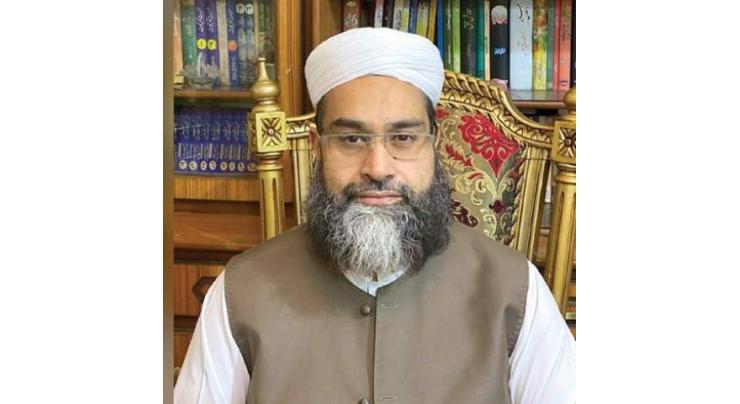
Ashrafi Debunks Misconceptions About Non-Muslims' Visit To Madina Munawarah
Mohammad Ali (@ChaudhryMAli88) Published January 11, 2024 | 06:27 PM

Prime Minister’s Special Representative for Religious Harmony and Pakistani Diaspora in the Middle East and Muslim countries, Hafiz Muhammad Tahir Mahmood Ashrafi on Thursday expressed concerns about the unjustified social media smear campaign against Saudi leadership
ISLAMABAD, (UrduPoint / Pakistan Point News - 11th Jan, 2024) Prime Minister’s Special Representative for Religious Harmony and Pakistani Diaspora in the middle East and Muslim countries, Hafiz Muhammad Tahir Mahmood Ashrafi on Thursday expressed concerns about the unjustified social media smear campaign against Saudi leadership.
He, in a statement, stressed the need to effectively counter the tactics, aimed at creating emotional confusion and gulf among admirers of Saudi Arabia.
He specifically referred to a controversy, following the visit of Indian delegation, led by Union Minister Smriti Irani, to Madina Munawarah during her two-day official visit to the Kingdom. The purpose of the visit was to sign a bilateral agreement allocating a quota of 175,025 pilgrims for this year's annual Hajj pilgrimage, he added.
Ashrafi, who is also the chairman of Pakistan Ulema Council, referred to a verse from the Holy Quran related to the prohibition of non-Muslims' visit, and clarified that this applied to just Masjid-e-Haram, according to the views of several Ulema and Mashaykh.
He cited religious decrees from Saudi Mufti Azam Ibn Baz and other prominent scholars, affirming that non-Muslims could indeed visit Madina Munawarah.
Emphasizing the historical context, Ashrafi highlighted instances from the era of the second Caliph Hazrat Umar (RA) when non-Muslims visited the Madina for trade purposes.
He also mentioned that even Christians from Najran visited Madina even during the lifetime the Holy Prophet Muhammad (Peace Be Upon Him).
Ashrafi discussed the two aspects of the visit, considering both Shariah and political dimensions. He asserted that Saudi religious scholars and leaders had a clear stance on the temporary visit of non-Muslims to Madina for specific purposes.
Addressing the political motives behind the visit, he urged critics to refrain from defaming the Saudi leadership, emphasizing that the Saudi government, clerics, and the nation were adhering to Shariah's guidelines in the best
interest of the Kingdom.
Concluding the remarks, Ashrafi urged those, spreading disinformation, to avoid comments on sensitive issues.
Related Topics
Recent Stories

Joint exercise of Pakistan Navy, US Navy held in Karachi

Currency Rate In Pakistan - Dollar, Euro, Pound, Riyal Rates On 2 May 2024

Today Gold Rate in Pakistan 02 May 2024

Dubai Police Marks International Workers' Day with 'Talabat' Riders

Sharjah Ruler inaugurates 15th annual Sharjah Children’s Reading Festival

Parineeti Chopra opens up about her decision to marry politician Raghav Chadha

PCB decides to set up training camp for national team ahead of England, Ireland ..

Virat Kohli's sweet birthday wish for Anushka Sharma

Interior Minister commends Pakistan Coast Guards

Pakistan women’s squad announced for England tour

Punjab CM Maryam inaugurates initiative of field hospitals

PM Shehbaz constitutes committee to investigate caretaker govt’s wheat import ..
More Stories From Pakistan
-

Joint exercise of Pakistan Navy, US Navy held in Karachi
15 seconds ago -
Two bodies found from Faisalabad
5 minutes ago -
IRSA releases 128,000 cusecs water
15 minutes ago -
Government accelerating its transformation target towards digital economy: minister
25 minutes ago -
Customs foil gold smuggling attempt at Karachi airport, arrest suspects
45 minutes ago -
Cloudy weather likely to persist in city
2 hours ago
-
Indian troops martyr 8 Kashmiris in April: report
2 hours ago -
1 killed, several injured in road accident
2 hours ago -
11 criminals arrested
2 hours ago -
IG inquires after health of injured police officials
10 hours ago -
Govt focuses on working class needs: Dastgir
12 hours ago -
Advocating for labour right is PPP’s legacy: Nasir Hussain
12 hours ago
